Essay On Time Machine (Structure/Outline)
- Introduction
- History Related to The Time Machine
- Permanency in The Time Machine
- Story and Sketch of The Time Machine
- Importance of The Time Machine
- Adaptations After The Time Machine
- The Time Machine; A Social Critique
- FAQs
Introduction
The Time Machine is a science fiction novella written by H.G. Wells and published in 1895, which describes the exploits of an unnamed time traveler as he moves through different timelines.
The story follows his journey to the distant future where robotic omniscient beings have taken over Earth and humanity has been split into two distinct species: the Eloi and the Morlocks.
Through his journey, the time traveler can understand the harsh realities of future civilizations, while also pondering the possibilities of time travel itself. This essay will explore in detail all aspects of The Time Machine, including its history, story, sketch, permanency, importance, and adaptations after its initial publication.
History Related to The Time Machine
The idea for The Time Machine came from Wells’ fascination with science, particularly the concept of time travel. He was also inspired by Charles Darwin’s theory of evolution, which was a major influence on his work. Additionally, he was influenced by the works of Jules Verne and H. Rider Haggard. Wells wrote the novella in 1895, during the height of the British Empire, and it was one of his earliest works to gain an international audience.
Permanency in The Time Machine
The central theme of The Time Machine is permanency, or the idea that certain things are unchangeable and will remain the same no matter how much time passes.
Wells uses this idea to explore the implications of time travel and its effects on human civilization. He suggests that, although some aspects of the future may be altered by time travelers, certain things remain unchanged due to their permanency.
Story and Sketch of The Time Machine
The Time Machine tells the story of a nameless time traveler who builds a mechanism called “The Time Machine”, which allows him to travel through different timelines. He travels to the year 802,701 AD, where he discovers humanity has split into two species: the Eloi and the Morlocks.
The Eloi are a peaceful, intelligent race who live in small villages and rely on agriculture for their sustenance. They are ruled by the Morlocks, an aggressive species that live underground and use technology to control and exploit the Eloi.
The time traveler eventually finds out that the Eloi and Morlocks have been locked in a vicious cycle of exploitation and domination since the dawn of time, and he is determined to disrupt this cycle.
He discovers another timeline where humanity has evolved into a perfect utopia, free from any suffering or pain. Inspired by this revelation, he sets out to make a better future for the Eloi and Morlocks by bringing back hope and freedom.
Discover More:
Importance of The Time Machine
The Time Machine is an important work in science fiction literature. Its themes and ideas have influenced many later works of science fiction, as well as inspired authors to create their own time-travel stories. It is widely considered to be one of the first works of its kind.
The Time Machine has had an immense impact on popular culture since its initial publication. It has been adapted into several films and television shows, as well as inspiring books, music, video games, and other forms of media. Additionally, the novella’s themes of exploration, curiosity, and hope have resonated with readers for generations.
Through time travel, individuals can explore periods and alternate realities that would otherwise be impossible to experience. This not only provides insight into the past but also gives us hope for the future. Time traveling has also enabled us to gain a deeper understanding of our world and how our actions can shape the future.
Adaptations After The Time Machine
The Time Machine has been adapted several times since its initial publication in 1895. In 1960, it was made into a feature film starring Rod Taylor and Alan Young. This adaptation was nominated for an Academy Award and still stands as one of the most successful screen adaptations of the novella.
In 2002, the story was adapted into a musical comedy by the BBC. This version featured newly composed music and songs, as well as a lighthearted approach to the source material.
In 2010, a live-action adaptation of The Time Machine was released. This version featured Guy Pearce as the time traveler and its visuals drew heavily from Wells’ original descriptions of the Morlocks and Eloi.
The latest adaptation is an animated feature from 2020, which was directed by Simon Wells, the great-grandson of H.G Wells. This version reimagines the story in a post-apocalyptic setting and features an entirely new cast and storyline.
In conclusion, The Time Machine has been highly influential in science fiction literature and popular culture for over a century. Its themes of exploration, curiosity, and hope have served to inspire readers and viewers alike. Through its many adaptations, the story of The Time Machine has remained an enduring classic that will continue to be enjoyed for generations to come.
The Time Machine; A Social Critique
The Time Machine is a classic example of science fiction that doubles as social commentary. By creating two distinct species, Wells was able to explore the notion of class division and how it can lead to exploitation and domination. He also used his story as a way to criticize the imperialist mindset prevalent during his lifetime.
Wells’ ideas remain relevant today, as the themes of class disparity and oppression have yet to be eradicated. The Time Machine serves as an important reminder of why individuals need to strive for a more equal and just society. By exploring alternate realities and timelines, Wells encourages us to think critically about our world and how we can make it better.
Finally, The Time Machine is a story of hope. Despite the grim setting and oppressive circumstances, Wells’ protagonist eventually finds a way to make a better future for the Eloi and Morlocks by bringing back hope and freedom. This is an important message that speaks to the power of courage and perseverance in the face of adversity.
FAQs
Is The Time Machine a real story?
No, The Time Machine is a science fiction novella written by H.G. Wells in 1895. It is widely considered to be one of the most influential works of its kind.
What is the main theme of The Time Machine?
The main theme of The Time Machine is exploration, curiosity, and hope.
How has The Time Machine been adapted?
The Time Machine has been adapted into several films and television shows, as well as inspiring books, video games, and other forms of media. It has also been adapted into a musical comedy by the BBC and an animated feature in 2020.
Who is the great-grandson of H. G. Wells?
Simon Wells is the great-grandson of H. G. Wells and the director of the 2020 animated adaptation of The Time Machine.
Can we travel back in time?
Unfortunately, there is no scientific evidence that suggests time travel is possible. However, The Time Machine remains an enduring classic that speaks to the power of imagination and hope.
What year did the time traveler travel to?
In the novella, The Time Traveler travels to 802,701 A.D., where he discovers a world divided between two separate species: the Eloi and Morlocks.
What is the symbolism of The Time Machine?
The Time Machine is a symbol of exploration, curiosity, and hope in the face of adversity.
Essay On Time Machine (Pdf & Infographics)
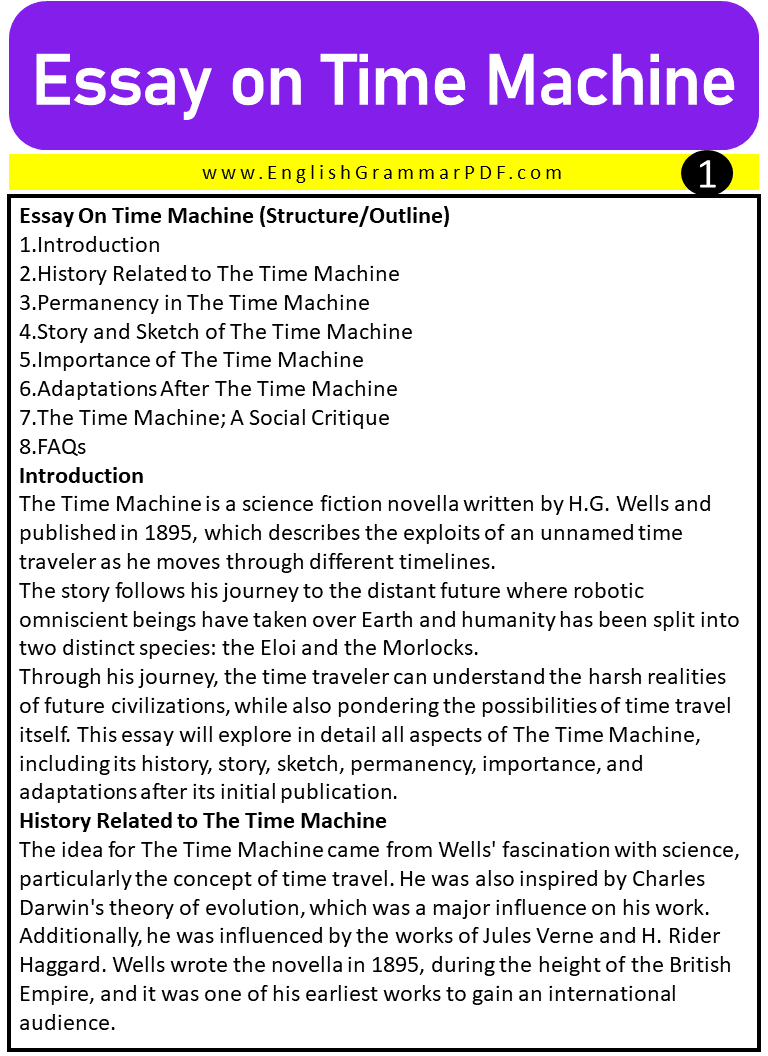
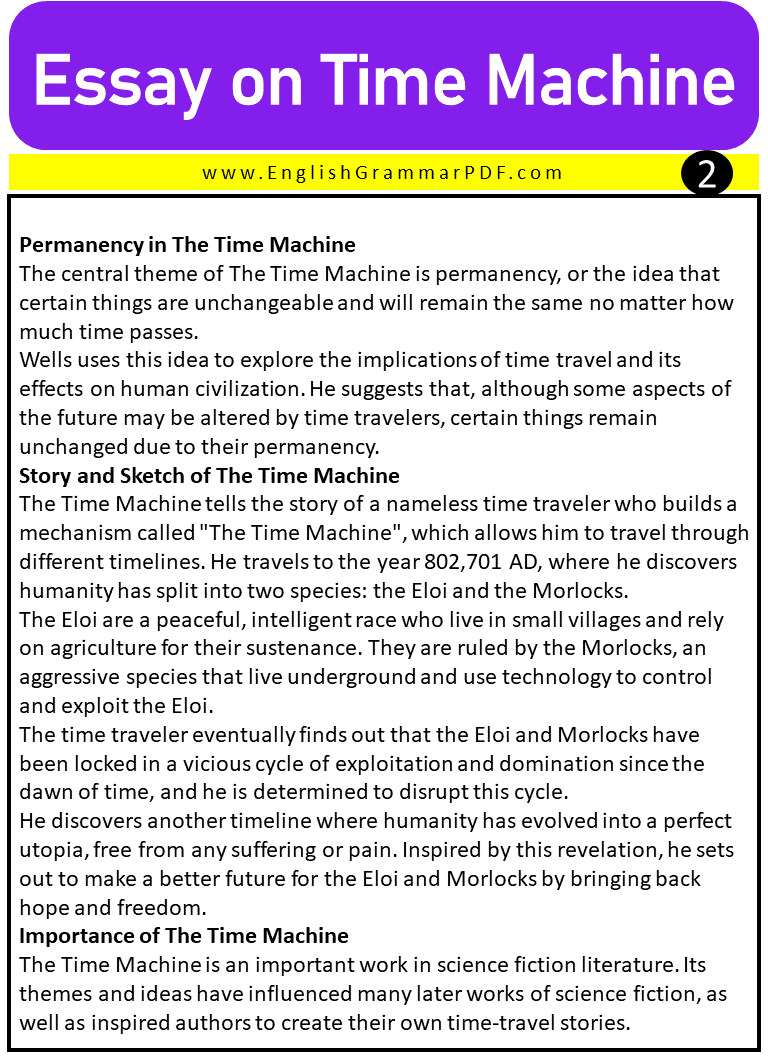
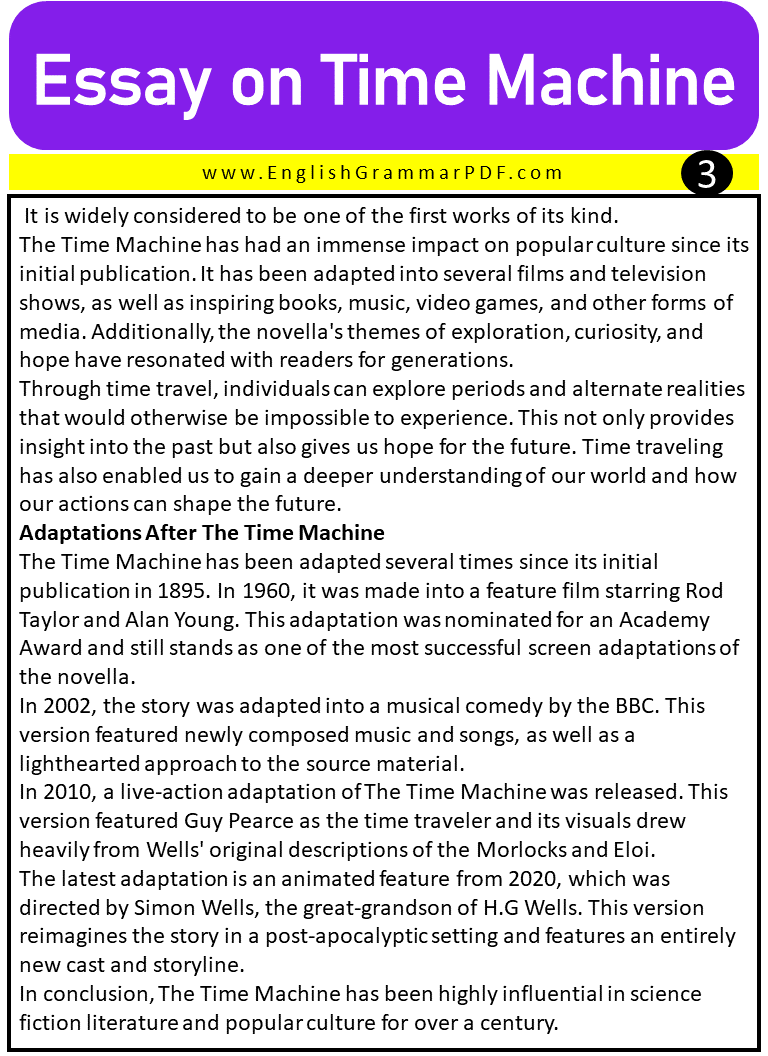
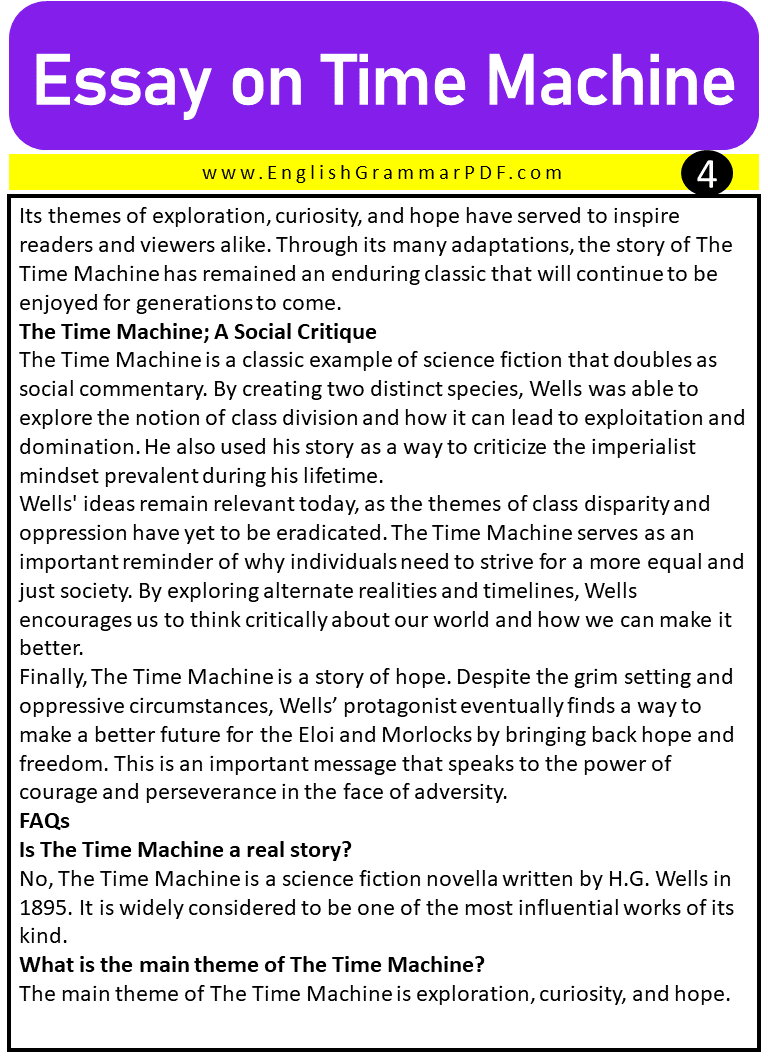
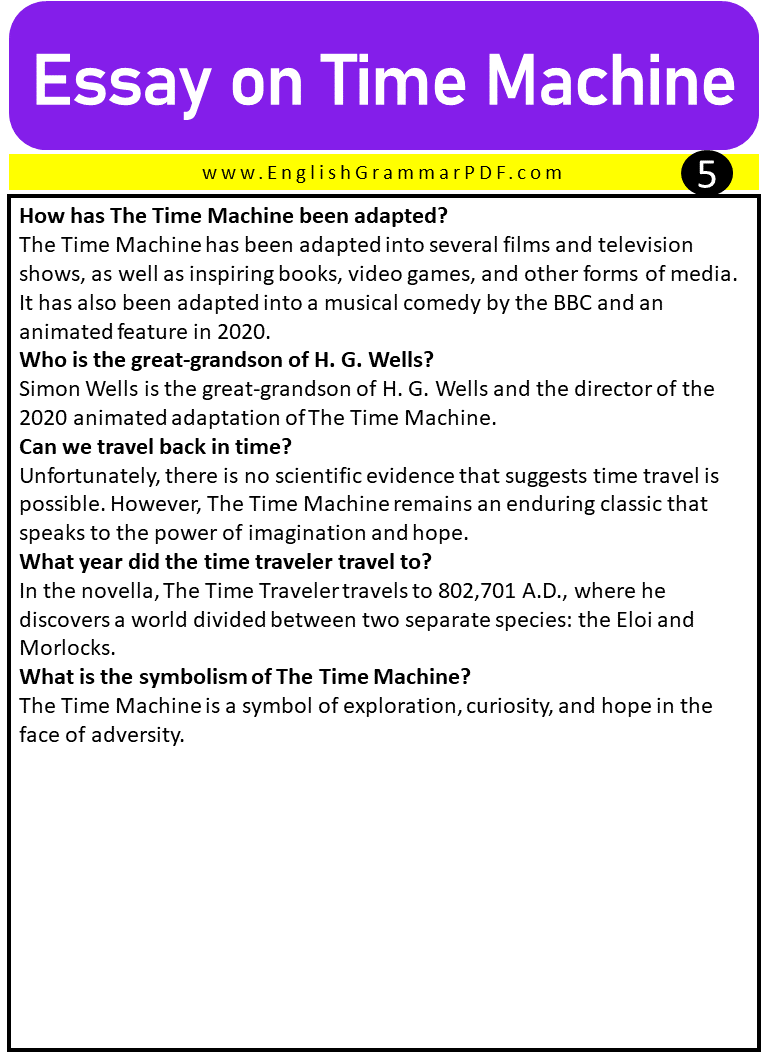
Below is the PDF BOOK of this Essay.


